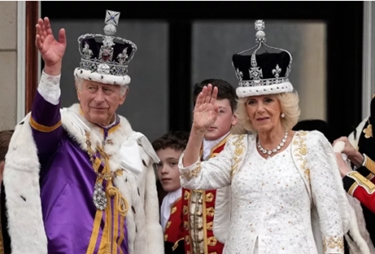Tariq Saeedi
Imagine being under the public scrutiny – mostly unkind scrutiny – 24/7-365, non-stop, cradle to grave, literally. Imagine every word you say or omit to say, every dress and accessory you wear, every smile and every frown of yours, being analyzed in a million different ways – the sheer cacophony.
Imagine the armchair pundits ‘explaining’ your body language to whoever cares to watch their show. Imagine being unable to defend yourself publicly. Imagine being under the slimy barrage of TikTokers and Youtubers whose vocabulary is less than 400 words but that doesn’t prevent them from bashing you in every illogical and unreasonable way. Imagine anyone who dares to speak in your favour, being called an ‘apologist’ and worse. — This is your life if you are born a royalty. — It is a tough and exacting mandate, wrapped in glitter.
King Charles III has just ascended the throne. As the King of the United Kingdom and other Commonwealth realms, during the next five or six years he may see the number of realms shrinking down to nine.
The future and role of the monarchy are under debate.
For the world outside the direct (and largely symbolic) rule of the King, the questions are two: 1. Is the British Monarchy a viable institution? and 2. If it is a viable institution, does it play any useful role for the world?
The first question is easy to answer. — Yes, the monarchy is a viable institution.
Here is why.
The world has been changing rapidly since the end of the WWII – furiously fast, upside down and inside out. As the swiftly transforming world was speeding across uncertainties, Princess Elizabeth became the queen of the seven independent Commonwealth countries and the head of the Commonwealth on the death of her father, King George VI in February 1952. She was just 25.
For the next 70 years, she was an institution unto herself. During her long reign, she quietly added some features that would ensure the continuation of monarchy in this day and age.
She instilled the sense of accountability: the closer you are to the throne, the more accountable you are to the nation.
She turned the monarchy into a meritocracy: Just being born into royalty is not enough. You have to prove your merit. Your position can move up or slide down, depending on the performance of your duties.
She strengthened the role of monarchy as a uniting force: There were numerous occasions when staying silent was not easy. The queen remained silent because she had faith in the ability of a thriving democracy to resolve the differences on its own. The monarchy was always there as a fallback option.
The monarchy, therefore, is a viable institution, thanks largely to how the Queen Elizabeth II managed it.
The next question is: Has the monarchy, as an institution, something to offer to the world?
To answer this question, we need to slash the lightest and the darkest parts of the vignette screen and stay in the middle. —– Whether we should do away with the monarchy right away or we should keep it alive at all costs – these two choices are not what we are trying to look at.
We are proceeding with the knowledge that even though nothing is indispensable, we must acknowledge and own the usefulness and relevance wherever we find it. This is the middle of the vignette screen.
In doing so, we are paying tribute to the person who worked as the ambulance driver and mechanic, ate in plastic plates when dining at home, shunned extravagance, and sent her own children to the war – Queen Elizabeth II.
Mainly because of her, the British Monarchy has the potential for a much larger and more valuable role in the world.
The monarchy – at least some prominent members of the royalty – are role models for the youth. This is vital when we see that the ‘influencers’ are leading the youth to the blind alleys.
Some members of the royalty are crowd pullers on their own. In the age of the social media, these crowds can be turned into communities. This is where the positive prompters start competing with the negative encouragements.
Some members of the monarchy are trendsetters. Thanks to their current preference for modestly priced dresses and accessories, some small and medium enterprises are pulling in very decent profits.
Some royals are actively encouraging a healthy lifestyle. This is helpful in stimulating the wellbeing of the youth.
The ownership of commendable causes is a readymade role for the monarchy. King Charles III has long been associated with the preservation of the wildlife, ecology, and environment.
Therefore, the monarchy is beneficial not just for the people of the Great Britain but the rest of the world.
Nevertheless, as mentioned earlier, like most other things the monarchy is not indispensable. For now, it is advisable to support the monarchy.
Every new generation of the royalty needs to find its own connection with the youth.
Long live the King! /// nCa, 8 May 2023
